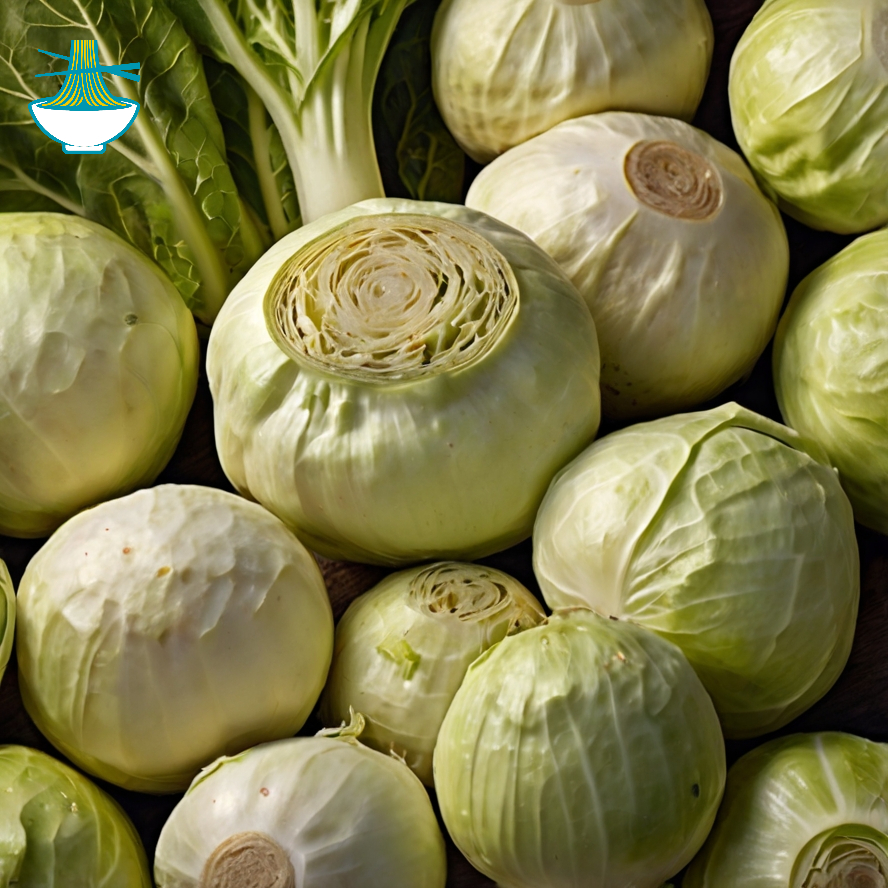Discover the versatility of kohlrabi with our easy-to-follow recipes. This unique cabbage is perfect for adding a crunchy texture to stews or serving as a delicious side dish. Whether you're a fan of hearty soups or looking for a fresh vegetable side, our kohlrabi recipes offer a variety of options to suit any taste. Learn how to prepare kohlrabi with simple ingredients and techniques to make the most out of this nutritious vegetable.
Ingredients:
- 2 large kohlrabi bulbs, peeled and diced
- 1 onion, chopped
- 3 cloves garlic, minced
- 2 carrots, sliced
- 2 potatoes, diced
- 1 bell pepper, chopped
- 4 cups vegetable or chicken broth
- 1 cup diced tomatoes
- 1 teaspoon ground cumin
- 1 teaspoon paprika
- 1/2 teaspoon turmeric
- 2 tablespoons olive oil
- Salt and pepper to taste
- Fresh parsley for garnish
Instructions:
Prepare the Vegetables: Peel and dice the kohlrabi bulbs. Chop the onion, mince the garlic, slice the carrots, and dice the potatoes. Chop the bell pepper.
Sauté the Aromatics: Heat olive oil in a large pot over medium heat. Add the chopped onion and cook until translucent. Stir in the minced garlic and cook for another minute.
Add the Vegetables: Add the diced kohlrabi, carrots, potatoes, and bell pepper to the pot. Cook for 5-7 minutes, stirring occasionally, until the vegetables start to soften.
Season and Simmer: Stir in the ground cumin, paprika, turmeric, salt, and pepper. Pour in the vegetable or chicken broth and diced tomatoes. Bring the mixture to a boil, then reduce the heat to low. Cover and let it simmer for 20-25 minutes, or until the vegetables are tender.
Garnish and Serve: Taste and adjust seasoning if necessary. Garnish with fresh parsley before serving.
Enjoy this comforting kohlrabi stew as a hearty meal on its own or as a flavorful side dish!
Nutritional Values
Kohlrabi
- 1 cup (135g) raw kohlrabi: 36 calories, 8g carbs, 2g protein, 0g fat, 5g fiber
Benefits:
- Rich in vitamin C, which boosts the immune system and supports skin health.
- High in fiber, aiding digestion and promoting gut health.
- Contains antioxidants and anti-inflammatory compounds that may reduce the risk of chronic diseases.
Onion
- 1 medium onion (110g): 44 calories, 10g carbs, 1g protein, 0g fat, 2g fiber
Benefits:
- Provides vitamin C and antioxidants that help fight inflammation.
- Contains compounds that may support heart health and lower blood sugar levels.
- Has antibacterial and antiviral properties.
Garlic
- 1 clove (3g): 4 calories, 1g carbs, 0.2g protein, 0g fat, 0.1g fiber
Benefits:
- Known for its immune-boosting properties and ability to combat infections.
- Contains allicin, which may reduce blood pressure and improve cardiovascular health.
- Antioxidant-rich, supporting overall health and longevity.
Carrots
- 1 medium carrot (61g): 25 calories, 6g carbs, 0.5g protein, 0g fat, 2g fiber
Benefits:
- High in beta-carotene, which is converted to vitamin A, promoting good vision and skin health.
- Contains antioxidants that support immune function and overall health.
- Good source of fiber, aiding digestion.
Potatoes
- 1 medium potato (150g): 110 calories, 26g carbs, 3g protein, 0g fat, 2g fiber
Benefits:
- Rich in potassium, which helps regulate blood pressure and fluid balance.
- Provides vitamin C and B vitamins, supporting energy metabolism and immune function.
- High in fiber, contributing to digestive health.
Bell Pepper
- 1 medium bell pepper (119g): 37 calories, 9g carbs, 1g protein, 0g fat, 3g fiber
Benefits:
- Excellent source of vitamin C, which is vital for immune health and collagen production.
- Contains antioxidants like beta-carotene and lutein, which support eye health.
- High in fiber, aiding digestion and overall gut health.
Vegetable or Chicken Broth
- 1 cup (240ml) vegetable broth: 10-20 calories, 1g carbs, 1g protein, 0g fat
- 1 cup (240ml) chicken broth: 15-30 calories, 1g carbs, 1g protein, 1-2g fat
Benefits:
- Provides flavor and nutrients without adding many calories.
- Chicken broth may offer additional protein and collagen if made from bones.
Diced Tomatoes
- 1 cup (240g) diced tomatoes: 32 calories, 7g carbs, 1g protein, 0g fat, 2g fiber
Benefits:
- Rich in vitamins A and C, promoting skin health and immune function.
- Contains lycopene, an antioxidant linked to reduced cancer risk and heart disease.
- Supports hydration due to high water content.
Olive Oil
- 1 tablespoon (14g): 120 calories, 0g carbs, 0g protein, 14g fat
Benefits:
- High in monounsaturated fats, which support heart health.
- Contains antioxidants like vitamin E, which can reduce inflammation and oxidative stress.
- Supports healthy cholesterol levels and overall cardiovascular health.
Spices (Cumin, Paprika, Turmeric)
- Cumin (1 teaspoon): 8 calories, 1g carbs, 0.4g protein, 0.5g fat
- Paprika (1 teaspoon): 6 calories, 1g carbs, 0.3g protein, 0.3g fat
- Turmeric (1 teaspoon): 8 calories, 1.5g carbs, 0.3g protein, 0.2g fat
Benefits:
- Cumin: Supports digestion and may have antimicrobial properties.
- Paprika: Rich in antioxidants, may enhance eye health and reduce inflammation.
- Turmeric: Contains curcumin, known for its anti-inflammatory and antioxidant effects, which may support joint health and overall wellness.
Salt and Pepper
- Salt (1 teaspoon): 2,300mg sodium (varies by type)
- Pepper (1 teaspoon): 6 calories, 1.5g carbs, 0.2g protein, 0.1g fat
Benefits:
- Salt: Essential for fluid balance and nerve function, but should be used in moderation to avoid high blood pressure.
- Pepper: May aid digestion and has antioxidant properties.
Fresh Parsley
- 1/4 cup (15g) fresh parsley: 5 calories, 1g carbs, 0.5g protein, 0g fat
Benefits:
- High in vitamins A, C, and K, supporting immune health and bone health.
- Contains antioxidants and anti-inflammatory compounds.
- May aid digestion and contribute to overall wellness.


Comments